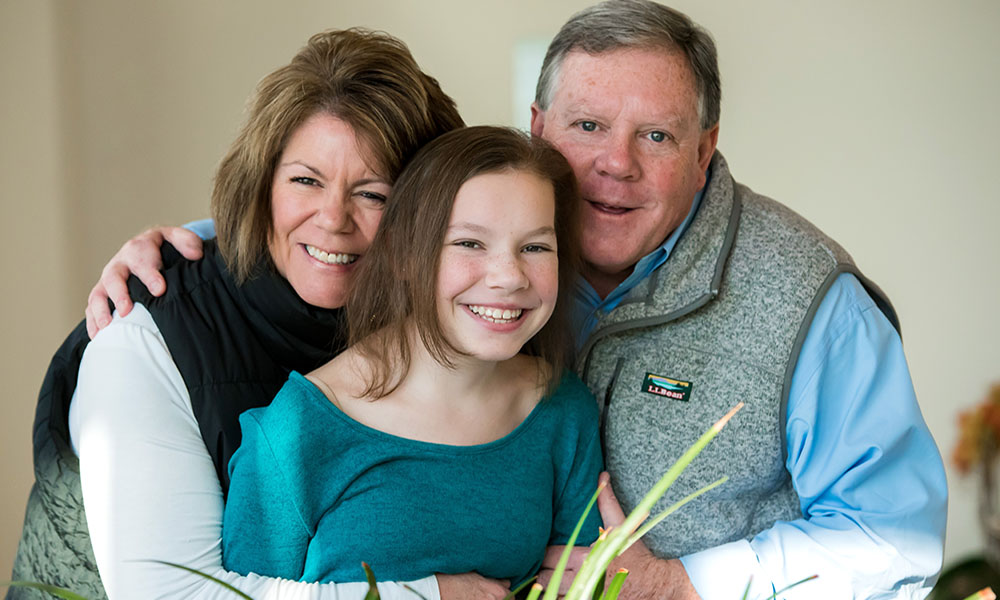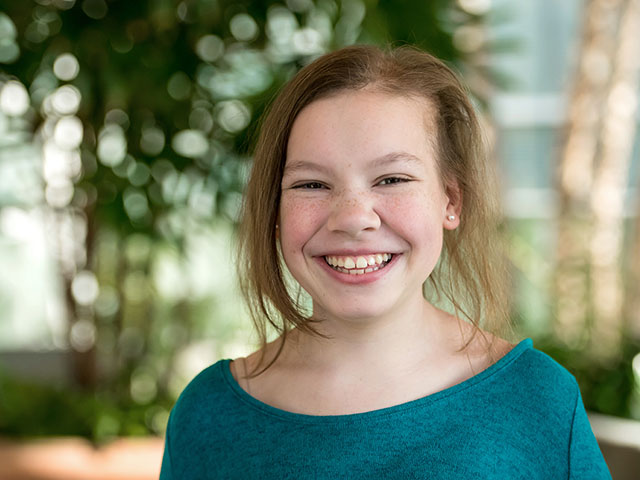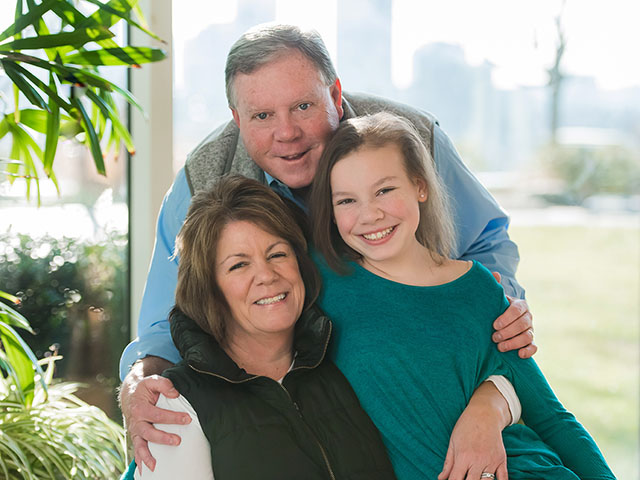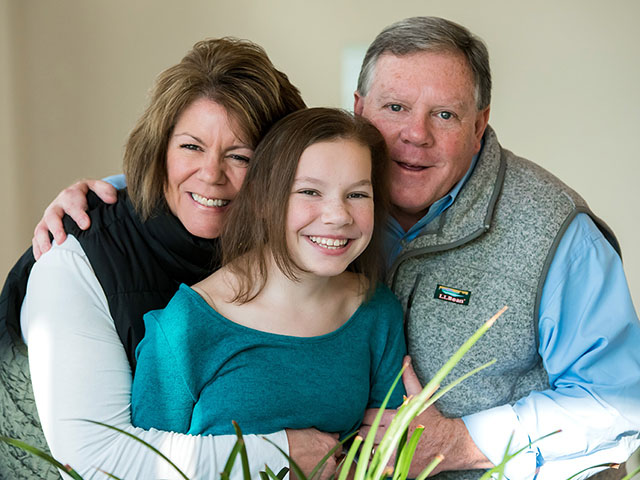Patient StoryNov | 14 | 2019
Nikki Schindler & Family


The Cancer Center’s Story Project is an effort to capture stories from our community of patients, friends, family, clinicians, and staff who have been affected by cancer in some way. This is Nikki and her family's story.
- Nikki Schindler was just 10 years old when she was diagnosed with a Medulloblastoma, a rare form of brain cancer. Since then, Nikki has used her voice to advocate and raise funds for childhood cancer research.
- “You can make a difference if you want to make a difference, Nikki taught me that. She knows what she's been through. She's met many kids here in the hospital and kids outside the hospital that have been affected by this disease. She's going to do whatever she can.”
How has your experience been at the Mass General Cancer Center?
Maureen Schindler: "Nikki was diagnosed in March of 2015. We took her to Children's Hospital to have surgery. Then Nikki needed Proton Beam Radiation Therapy that only Mass General offered. We planned on returning to Children’s, but once we met all the people at Mass General for Children, we knew that we were never going back, that we were here to stay."
You are quite the philanthropist, can you tell me what prompted you to start your advocacy work?
Jerry Schindler: "Nikki was diagnosed with a medulloblastoma, a brain cancer, and has done a lot of fundraising herself, and has donated all of the money back to Mass General. She’s designed a T-shirt with "cure" written on the back, all her own design. Nikki’s also done a lot of public speaking on behalf of childhood cancer."
"Last year Nikki won the Citizen Scholarship Award at her school for her going through what she's been through, but more importantly, dealing with everything she's dealing with. To be able to put the brakes on and take time to raise awareness, to raise money, and donate the money back to researchers at the hospital, it’s incredible of her."
You’ve grown up with this disease. How has that affected your life?

Nikki: "I was 10 when I was diagnosed, at the bridge of elementary school and middle school. I missed that transition, so it was hard for me to get back into school. I had to meet all the new people, and learn different things. I feel like I am now wiser than my friends in some sort of way. I’m back to a pretty normal school schedule now."
"It's made me think about life, how you have to cherish every day, you have to live every day to the fullest, and you can't really think about the silly things of life, like, ‘Oh, I forgot this at my house today, I can't do this today at school.’ You really can't think about that. You need to look at the big picture. I have a best friend, her name's Audrey, she went through everything with me. She was my rock."
Outside of the hospital, what kinds of activities do you like to do in your free time?
Nikki: "I'm in volunteer club, I do Crafts for a Cause, and I’m a dancer, too. The volunteer club organized a fundraiser last year in September, and all the money that we raised went to Make-A-Wish. We raised $4,000."
Jerry: "Nikki was the recipient of Make-A-Wish three years ago. She chose to go to Disney World."
When you think about your life ten, fifteen years, what do you see yourself doing when you've grown up?
Nikki: "I think I want to be a child life specialist, or something in that field. They are usually at hospitals."
Maureen: "We found the profession when we came here. They are on the floors and in the clinics. They just do fun things, they help you get through difficult times, and they help you if you need to have your blood drawn or whatever. They’re awesome."
Jerry: "When you're in [the hospital] as much as Nikki is, all the kids get to know everybody. You even get to know the therapy dogs."
What has your experience been like with this disease and the treatment?

Maureen: "The treatment that the kids get is a slice of what adults get. There's no treatment that's specifically designed for children. Nikki’s side effects, I hate to say it, but they are catastrophic. To save her life she had to have aggressive rounds of chemo… now she’s dealing with multiple side effects. Nikki’s raising money and awareness to help improve that, and that's the exciting thing about medical research, things are changing by leaps and bounds."
"People need to understand this disease, how it affects kids, teenagers. We need more education around that. Nikki is the first person in the Norwell, Massachusetts school system to have their brain radiated and still be able to come back and go to school. It’s uncharted territory for everyone. We see the gaps and we see as a family what needs to improve for these kids."
What would you say to yourself when you were diagnosed, and to other kids who have just received their diagnosis?
Nikki: "You have to think of the future. In a few months from now, what can that be? I always thought in the future, that in a few months from now, I could be better. I’ve always thought ‘out of everything bad, comes something good.’ I got so many good things out of something awful. I got so many more chances. I got to see so many amazing things when I was sick, and I still get to see so many amazing things and I can public speak now. None of my friends can do that, you know."
Maureen: "Nikki and her brothers have done a lot of things that we would never have had the opportunity to do. We got this diagnosis, and our lives will never be the same. I didn't really absorb that in a way, you know? It just happened so fast. What's our home base life all about? Our work life? What we do with the kids? It’s changed how we communicate, it's good in some ways and bad in other ways. Our kids are no longer protected. They've been exposed to this disease and how short life could be, and the hardships that come with it. There's good things that come of it, but I would rather have life without this disease."
"We became very open as a family. We want others to learn from us. Nikki is a young woman out there talking about this, making society, making students in middle school and high school aware of this disease."
Nikki: "Awareness raises money and money drives research, and research equals a cure."
Maureen: "Nikki walked out last in the [Friends of Mass General] Fashion Show and she was totally bald, really sick, and she rocked the show and raised a lot of money. She walked with her radiation nurse. Her picture even made it into the Sunday Globe."
What are some experiences here at the hospital that stand out to you?

Nikki: "Here the nurses stay with you. My nurse's name is Rhonda, she’s the only nurse I see here. If I ever broke my arm or something no one would ever put my IV in except Rhonda."
Jerry: "We got to know everybody upstairs, and they know us. They know our problems, it's marvelous for the kids and just wonderful for the parents too."
Nikki: "I had a port and I was sick one night and I came in and they couldn't access my port, they couldn't draw blood. It was awful, it was totally awful. They have nurses coming in, and they still couldn't do it. They told me I needed to get a new port. We had to call a nurse from the [pediatric] floor who we know, and they had to come down and access it."
"We started some training so that other kids don’t have to go through that. The night nurses in the Emergency Department now get trained on how to access pediatric patient ports."
Jerry: "Nikki met the head of nursing, the highest staff to talk about this type of training. Because of her advocacy work, there now have to be four nurses trained every night for this."
Any final thoughts?
Jerry: "You can make a difference if you want to make a difference, Nikki taught me that. She knows what she's been through. She's met many kids here in the hospital and kids outside the hospital that have been affected by this disease. She's going to do whatever she can. She gets it."
Nikki SchindlerIt's made me think about life, how you have to cherish every day, you have to live every day to the fullest, and you can't really think about the silly things of life.
This interview was conducted on January 14, 2019 and has been edited for clarity.
Related Programs
Type
Centers and Departments
Topics
Patient Stories
View inspiring cancer survivor stories from Mass General Brigham Cancer Institute’s community of patients, families, and staff.
Supportive Care Services
Our support programs can help patients and their families cope with the challenges of a cancer diagnosis.
